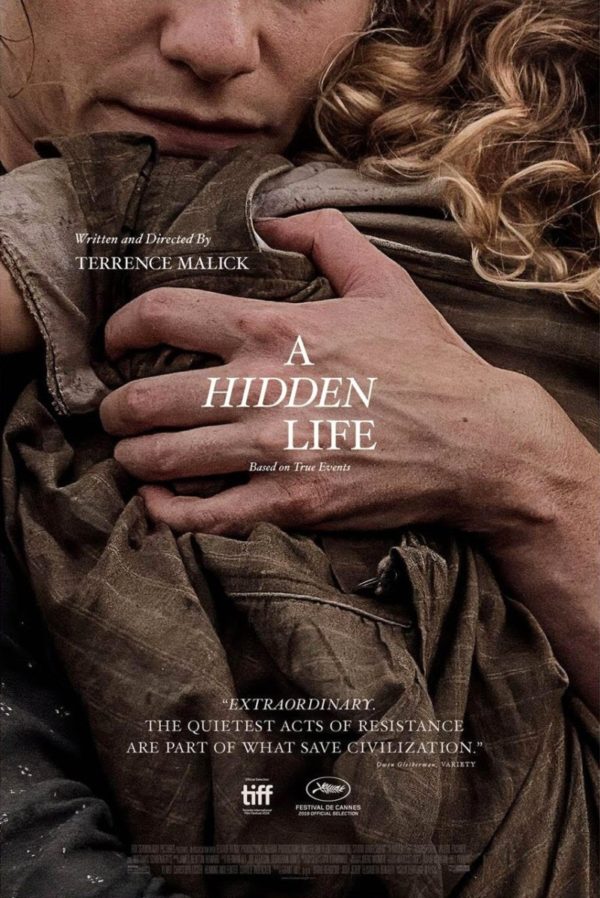A Hidden Life, 2019.
Written and Directed by Terrence Malick.
Starring August Diehl, Valerie Pachner, Michael Nyqvist, Matthias Schoenaerts, Jürgen Prochnow, Bruno Ganz, Alexander Fehling, Ulrich Matthes, Karl Markovics, Franz Rogowski, Tobias Moretti, Martin Wuttke, Max Mauff, Johan Leysen, Waldemar Kobus, Sophie Rois, Maria Simon, and Nicholas Reinke.
SYNOPSIS:
The Austrian Blessed Franz Jägerstätter, a conscientious objector, refuses to fight for the Nazis in World War II.
Here’s an A Hidden Life drinking game for you: take a shot every time the sumptuous cinematography from Jörg Widmer highlights characters interlocking their hands together, mundane farming exercises are carried out, someone reads a poetic letter, or Franz refuses to pledge loyalty to Adolf Hitler. On second thought, don’t do that because you will probably die by hour one of this latest three-hour artistic expression from writer and director Terrence Malick, which thankfully sees the filmmaker returning to straightforward narrative storytelling as his latest freewheeling experiences were beyond self-indulgent and insufferable. A Hidden Life is still excessive but is executed in a manner that leads to a powerful display of conviction and resilience with a genuinely sad ending.
Pooling together an array of respected German-speaking talent (of which supporting players Bruno Gans and Michael Nyqvist are actually now deceased as this film is releasing over three years after entering production), August Diehl portrays real-life conscientious objector Franz Jägerstätter, who refused to take part in World War II fighting for the Nazis on his own moral grounds and was, obviously, severely punished for what was seen as traitorous behavior. Often sent to partake in military training but never officially drafted, Franz is eventually chosen for battle, quickly objecting and unwilling to listen to anyone around him within the farming community. As a result, it’s not long before he’s thrown into prison after prison, plucked away from his wife Franziska Jägerstätter (Valerie Pachner) and three daughters.
What ensues from there on out (after roughly 45 minutes of peaceful living covering a few years) is a series of letters being written back to one another and read aloud in narration (they are based on the works found in Franz Jägerstätter: Letters and Writings from Prison), most of which are philosophical and/or religious in context, providing unwavering support to one another, on-screen sometimes lyrically set to physical abuse in prison. The contrast between life on the outside and inside is also strikingly made apparent, although Terrence Malick employs his usual bag of tricks (filming up close and often not unique angles, methodical editing to hone in on key gestures, etc.) to make for beauty regardless of location.
The three-hour running time is certainly an endurance test, but mostly by design as various characters do everything they can over the course of 1943 to break Franz, repeatedly giving him opportunity after opportunity to obey the commands in exchange for his life. This means that a great deal of the middle stretch is somewhat redundant, but as the noose begins to tighten, so to speak, A Hidden Life builds to an emotionally charged climax complete with a number of memorable scenes (most notably, the final meeting between husband and wife that ends in defiance, one last display of romance, and heartbreak). That doesn’t mean the quieter moments are bad, there’s just (as usual) far too much as the film somewhat beats its point over the head.
Terrence Malick doesn’t try to hide in the parallels between the Nazi party and the current political landscape, which works in favor of the film considering A Hidden Life is essentially three hours of valiantly and firmly grasping onto one’s morals and never letting go, no matter how dark the consequences might get, at a time when certain pockets of the general public are losing those same morals. There’s also a beautiful orchestral score from James Newton Howard that implements the sounds of multiple objects into its compositions, heightening the drama unfolding.
At the same time, A Hidden Life is unlikely to change anyone’s opinion on Terrence Malick, even if it is unquestionably his best film since Tree of Life. Pretty much the only form of English communication between characters is from the letters (there are no subtitles for any of the German spoken dialogue, which is unnecessary anyway given that it’s always clear what is being said through the sublime direction), and when that’s not happening it’s time to soak in some more gorgeous vistas. Terrence Malick continues to cinematically operate first and foremost with visual storytelling, and largely succeeds here given the universally engaging narrative, melancholy tone, and devastating ending. It’s still a test of patience, but it’s also a promise at returning to form as an all-time great filmmaker.
Flickering Myth Rating – Film: ★ ★ ★ / Movie: ★ ★ ★
Robert Kojder is a member of the Chicago Film Critics Association and the Flickering Myth Reviews Editor. Check here for new reviews, friend me on Facebook, follow my Twitter or Letterboxd, check out my personal non-Flickering Myth affiliated Patreon, or email me at MetalGearSolid719@gmail.com














